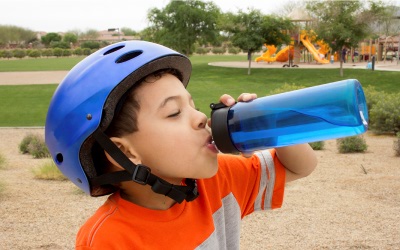Rise of Sports Drinks is Cause of Concern for Child Wellness
You know why sugar-sweetened beverages (SSBs) are bad for your children’s wellness; consumption of SSBs is associated with excess weight gain, poor nutrition, and a higher risk for chronic diseases, such as diabetes. In the past 30 years, there has been a significant increase of child SSB consumption, with US teens now getting 10-15% of their caloric intake from SSBs. However, before you take away your child’s fizzy drinks, you may also want to eye up the other beverages in your home.
As a category of beverages, the term SSB also covers sports drinks or electrolyte drinks, sweetened tea, fruit-flavoured drinks and punches and other beverages that contain large amounts of added sugar. Between 1989 and 2008, the amount of US kids aged six to 11 consuming sports drinks increased ten times over. In fact, sports drinks were the third fastest growing beverage category in America in 2006, with 2008 sales reaching a whopping $7.5 billion.
Created in 1965, sports drinks were designed for athletes or individuals participating in prolonged vigorous physical activity, and for those performing in high temperatures and humidity in particular. This leads many to believe that sports drinks are beneficial to your wellbeing, but while sports drinks contain water, carbohydrates and electrolytes (such as potassium), they can also contain as much as 10 teaspoons of sugar per small bottle, 500mg of salt and 200 calories.
According to the American Heart Association, most children and teenage girls should not consume more than 20 grams (four teaspoons) of added sugars per day, and teenage boys should consume no more than 33 grams (6.5 teaspoons) of added sugars per day. However, it’s not just your child’s sugar intake that you have to worry about; SSB consumption has been proven to reduce child consumption of milk, as well as calcium, vitamin D and folate.
Given the already elevated levels of added sugar in the Western diet – and its detrimental impact on health – the increased consumption of sports drinks in recent years is of growing concern for parents, health professionals and public health advocates. Water is recommended by the Academy of Nutrition and Dietetics as the best and most economical source of fluid for activity lasting less than an hour for children in organised sports. Remember, you should drink 1ml water for every calorie you eat, so children eating 800 calories a day will need 800ml of water.


Comments are closed.